Management: Reviews are inherently an act of attempting to paint the personal as the universal, but this piece in particular is overtly meant to share my personal experience of this show. I hope you enjoy it.
“Coming of age stories” generally have a very specific connotation, particularly when it comes to anime. They tend to focus on adolescence – on the discarding of our youthful conceptions of self, and the beginning stages of establishing a true mature identity. But the reality is life is not nearly that simple. You do not simply discover yourself at some arbitrary point in your teen years, and from then on no longer feel existential dread about self or purpose. You don’t wake up one morning and suddenly realize it’s time to Do Your Best for the rest of forever, and somehow find yourself continuously fulfilled by that one measly resolution.
Uchouten Kazoku understands this. It understands life and self-actualization are never so convenient as most stories’ linear narratives would like to pretend. It understands that living is not a coherent progression – living is what you’re already doing while you try and make sense of it all. And Uchouten Kazoku embraces this; the small lessons, warm friendships, and tiny moments that seem may inconsequential from an outside perspective, but that make up life itself, and when fully embraced, fully lived in, can swell to be heart-seizing moments on a monumental scale.
Uchouten Kazoku is likely the best anime of the year.
The show takes place in Kyoto – a fact that needs to be established first, because the landscape of Kyoto is undoubtedly one of the central characters of the show. Using a method of creating backgrounds that seems to have involved first taking a mountain of actual photos, and then filling them in with a dizzying array of idealized color palettes and stylish visual flourishes, the show’s backgrounds bloom off the screen in greens and greys and purples and blues, casting scenes in stark emotional tones while creating a grounded, relatable sense of space at all times. You could easily spend as much time just drowning in this show’s mastery of color and shot composition as actually watching it – believe me, I have. In addition to the larger concerns of overall aesthetic and tone, the constant subtle visual details throughout both tell quirky stories of their own and reveal as much about the characters and their lives as the dialogue or careful, evocative animation.
The story is centered on the Shimogamo family – a family of tanukis (the show plays very fast and loose with its magical realism, but the central assumption is this is a world where tengu, humans, and tanuki all coexist in a possibly-hierarchical society, with the humans being somewhat oblivious to the arrangement) consisting of four brothers and their fairly idiosyncratic (yes, the first word that came to mind was eccentric) mother. The family members are each extremely distinct and sharply portrayed, but what they share is what they lack – the event that looms over the family, and the narrative itself, is the unresolved death of their father.
The first half of the narrative concerns itself with carefully portraying this world, these characters, and the moments they share through a series of evocative slice-of-life vignettes. The show focuses on Yasaburou, the third son, who professes himself to be a dedicated seeker of an interesting life. Not necessarily an ambitious one, or even a successful one – just an interesting one. The first episode portrays both his interpretation of this creed and the underlying lie it smooths over extraordinarily well, when Yasaburou is tasked by his former professor (Akadama-sensei, a tengu whose slow descent into old age and dependence is portrayed with a mixture of comedy, tragedy, and fear that rings incredibly true) to summon the professor’s elusive protege Benten.
Benten herself is definitely one of the show’s most mysterious and alluring creations. And with good reason – Yasaburou himself is captivated by her mixture of freedom, danger, and warmth, and the show does a masterful job of portraying Benten as he sees her. Their first meeting, one of a series of efficient and evocative flashbacks scattered throughout the show, reveals Benten displaying her mastery of the tengu’s signature power, flying through the branches of a cherry tree in gorgeous full bloom, the beauty of the moment perfectly capturing that mixture of awe and distance that always underlines their ostensibly warm relationship. And that distance is not merely based on the fraught nature of their interactions – Benten has attached herself to the ominous collection of humans known as the Friday Fellows, a group known largely for their annual New Year’s Bash, where each year a tanuki is cooked and eaten. Which just so happened to be the exact fate of Yasaburou’s father.
So when Yasaburou goes to summon Benten, there’s some understandable baggage there. But there’s also a philosophical disconnect – in spite of Yasaburou’s claims of being an absolute free spirit, it is still he who dutifully cares for his old professor, still he who goes off and makes sure Benten at least knows the professor still thinks about her. His philosophy does not match with his underlying values, and his slow march towards self-awareness is essentially never acknowledged by the show itself, but undoubtedly one of the central threads of the show.
This is something of a key refrain with Uchouten Kazoku – a reliance not on dramatic character turns, but on slow journeys of self-realization and self-acceptance. In the first half, the family and its surrounding world is firmly established through these various small adventures, which through their very elaboration demonstrate the ephemeral happiness and sense of wonder that Yasaburou seeks in life. A voyage through a mysterious teahouse and out onto an improbably vast lake, where Yasaburou rows to a sunken castle and watches Benten pull a whale’s tail. A drunken festival celebrated from a flying teahouse, culminating in a midair fireworks battle with the Shimogamo’s dastardly cousins. And the last and most powerful, a dinner Benten arranges between Yasaburou and the Friday Fellows, which is cut short when Benten pulls Yasaburou up onto the Kyoto skyline for drinks beneath a gorgeous, overwhelming full moon. “I like you so much I want to eat you… but then you’d be gone” she murmurs, summing up that intangible unreachability of life’s perfect moments, the moments that can only be reached towards and perhaps lightly brushed, but never captured.
In its second half, Uchouten Kazoku is forced to acknowledge the moments that gird these transcendent memories, the fundamental grief of living and the fundamental strength of not living alone. The death of their father hangs over each of these brothers, though they express it in different ways. Yaichirou, the eldest, attempts to become his father, adopting a self-serious facade (again, something the show doesn’t directly address, and reveals instead through the variety of selves he assumes in the company of anyone but his closest family) and campaigning for the role of Nise-emon, the tanuki leadership position his father once held. Yajirou, the second-oldest, blames himself for their father’s death – it was he that was out drinking with their father on the night of his capture, and as penance he has confined himself to be no more than a frog in a well, withdrawing both from responsibility and from blame. Yasaburou, our central protagonist, tends to disconnect from life in his own way – but his fundamental nature shines through far more often than the others, and his competency as most direct heir of their father’s “idiot blood” certainly helps keep the family together. And Yashirou, the youngest, essentially embraces his boyhood, hiding behind the others, never acting for himself.
This pattern of avoidance cannot last, and the breaking point comes with the revelation of Yajirou’s alleged culpability in their father’s death. In confronting Yajirou, the family is forced to confront their own protracted grieving process, and they come together as a result. Their mother admits she knew of Yajirou’s guilt all along, and Yaichirou forgives his brother, crying out that it is his very empathy for Yajirou that makes the pain so hard to bear. In this solemn moment, Yasaburou is struck by one of those strange ironies of life – though he is no longer there to guide them, even their father’s death has made them a stronger, more united and loving family.
But this is not their final turn. The last act of the show concerns the election of the new Nise-emon, pitting Yaichirou against the estranged brother of their father, Soun Ebisugawa. In the course of this conflict, it is ultimately revealed that Soun himself orchestrated the death of their father – his coveting of the full and satisfying life of his brother led him to betray his own family, which in the context of Uchouten Kazoku is essentially the gravest sin imaginable. This revelation almost comes too late for the Shimogamos, as Soun’s new plan leads to the capture of nearly the entire family. Only through the skilled actions of Soun’s own daughter Kaisei is Yashirou able to escape, beginning an avalanche of character turns that leads to both a full unveiling of Soun’s secrets and one of the most iconic images I’ve come across in the medium – Yajirou drunk and triumphant, barreling towards his captive family in the form of an electric railcar as he soars across the moon.
The plot resolves itself with grace and lightness, in the manner the show always proceeds. In doing so, it neatly ties together the various thematic threads the show has gathered along the way. First and foremost among these is Family – the power and necessity of the bonds we share with those we love. Though this show loves the whimsical and free-spirited, and readily agrees that the ways we show our love can be convoluted or confused, it ultimately makes clear that it is our ability to rely on, aid, and forgive our family that makes us great. And it doesn’t set this purely in terms of biological family – Benten’s own arc concludes with her rejecting the false adopted family of the Friday Fellows, and returning to the family she’s been subversively aiding all along – the professor and her fellow students.
The show is also deeply concerned with perception and identity – beyond the overt focus on shape-shifting characters, the idea of “what a tanuki would do” or “what a human would do” are raised throughout, both to defend the actions of tanukis and condemn those of other, apparently less noble species. Ultimately, this narrow view of identity is shattered by the ending, wherein Soun rails at the perceived evil of humans even as his own wrongdoing and rejection of family are revealed. Meanwhile, Yasaburou’s new human friend within the Friday Fellows makes a definitive moral stand, protecting the tanuki he had already formed a bond with and loudly decrying both the Friday Fellows and tradition altogether. Tradition in general takes a beating in this show – though the election of the Nise-emon consumes the narrative of the last act, it ultimately reveals itself to be no more than an empty icon of status, akin to going through the motions of a happy life (making it understandable why Soun so values it, given that he has abandoned family in pursuit of the hollow trappings of success). No brother save Yaichirou seems to care for the election, and even Yaichirou ultimately is able to see his determination as a denial of self, a way of holding onto the ghost of his father instead of living in the moment and embracing the opportunities and family that surround him.
That embracing of life as it happens is this show’s final thematic thread, spanning from the first playful commands of the opening song (“BE INTERESTING!” “WONDERFUL DAILY LIFE!”) to the last, idyllic moments of the epilogue. It’s displayed in the show’s own surfeit of beautiful moments, evocatively demonstrating the clear beauty of simply living. It’s displayed in the show’s various character arcs, from Yajirou’s ultimate recollection of their father’s final words (“What is fun is good!”) to Yaichirou being fondly told by the professor to chill out a little. Frankly, it’s displayed in every element of this show – the entire production gleams with a genuine embracing of life, visible in the beautiful shimmering reflections of a babbling stream or even the bracing pain of truly empathizing with another. It’s full of laughter and triumph and tears, and though it exists in a magical world, the magic it truly emphasizes is something all of us can relate to. Though this show features shape-changing raccoons and fans that summon tempests and that mystical False Eizan Electric Railcar, the very last scene of the show depicts the Shimogamo family and friends quietly sharing soup with the neighbors and peeling mandarins with their close friends. And there is nothing more pure and magical than that.
Uchouten Kazoku is close to a perfect show in all regards, and constantly reminds me why I truly, deeply love this medium. I award it a 10/10.

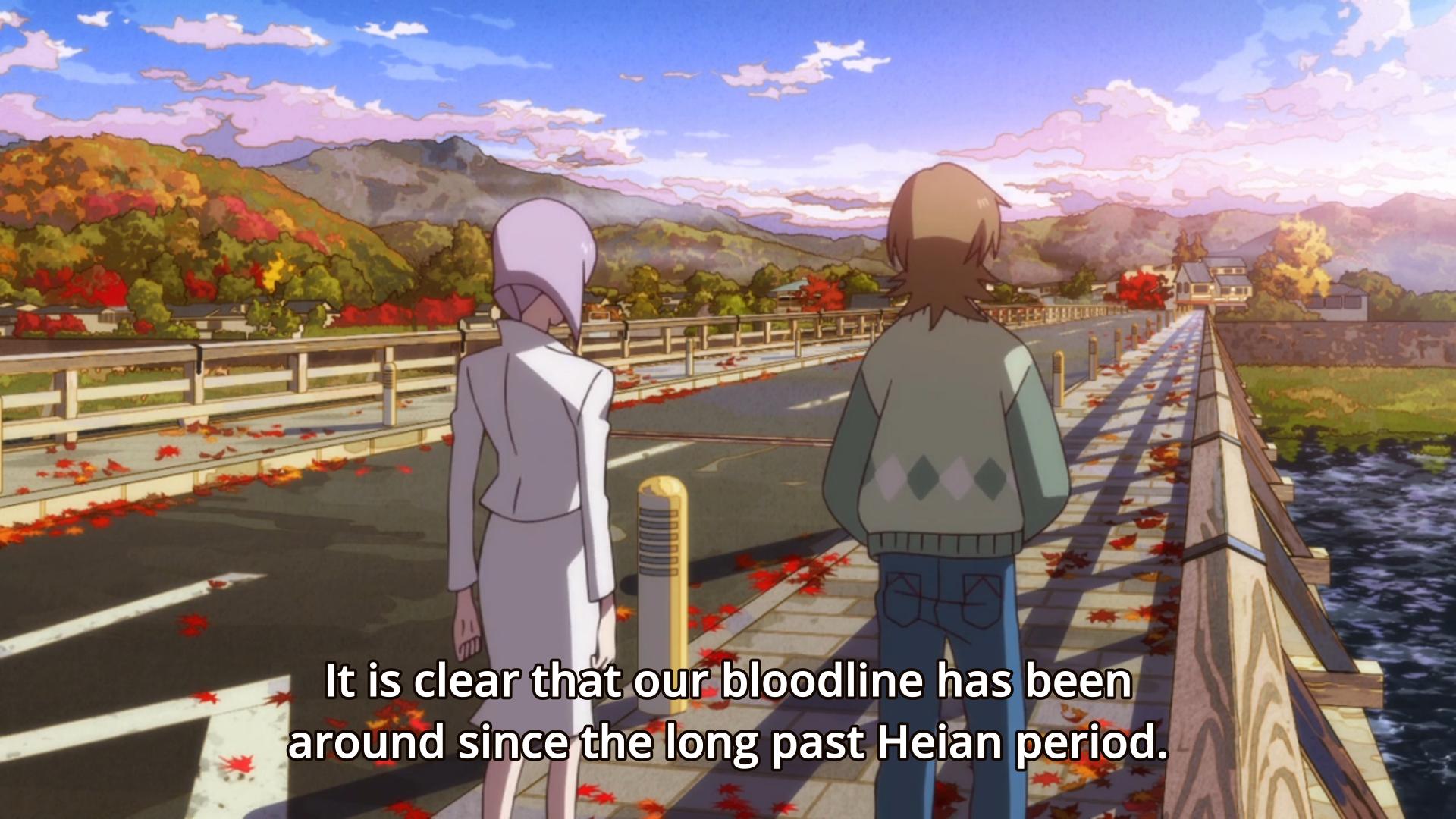
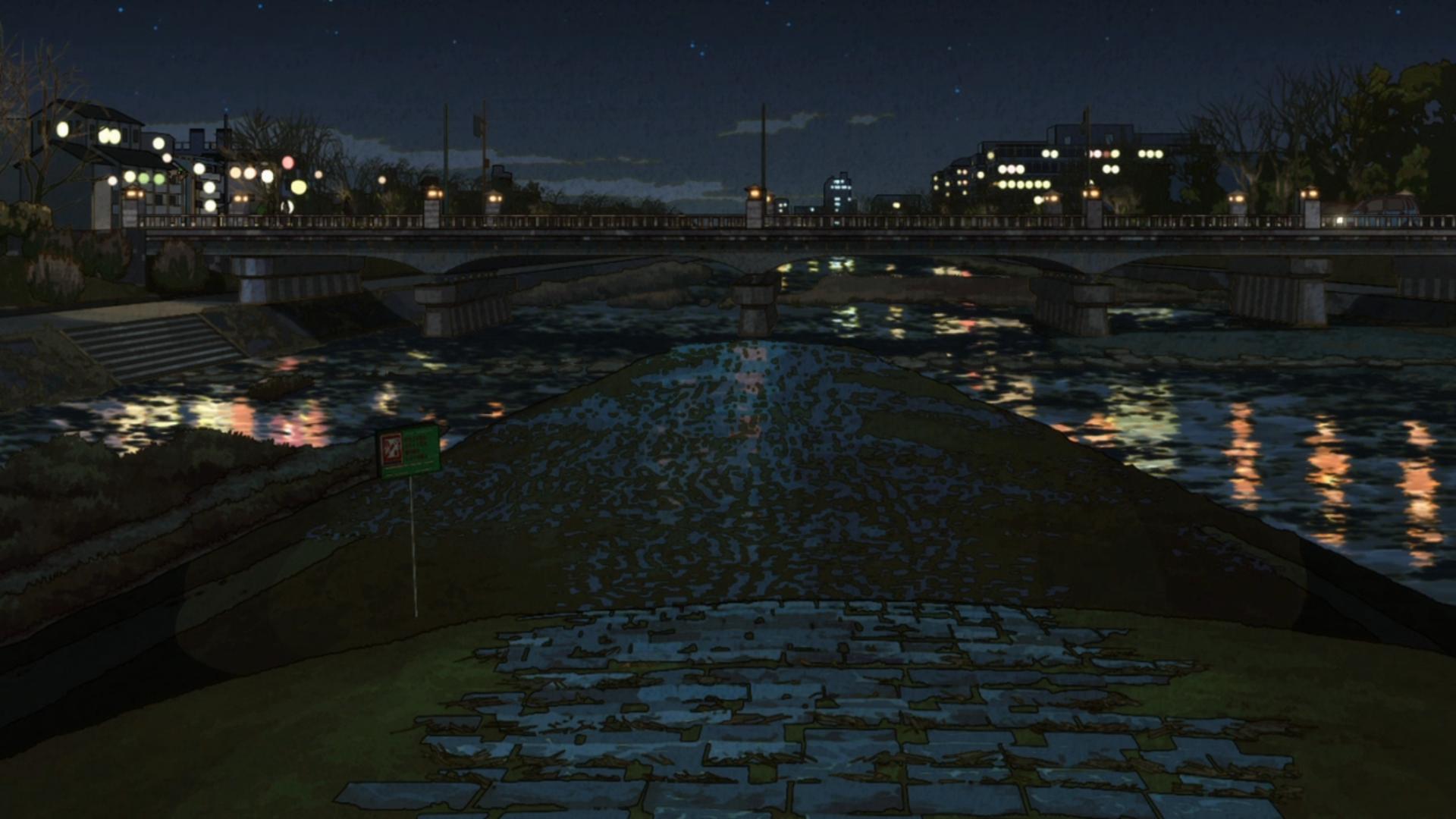
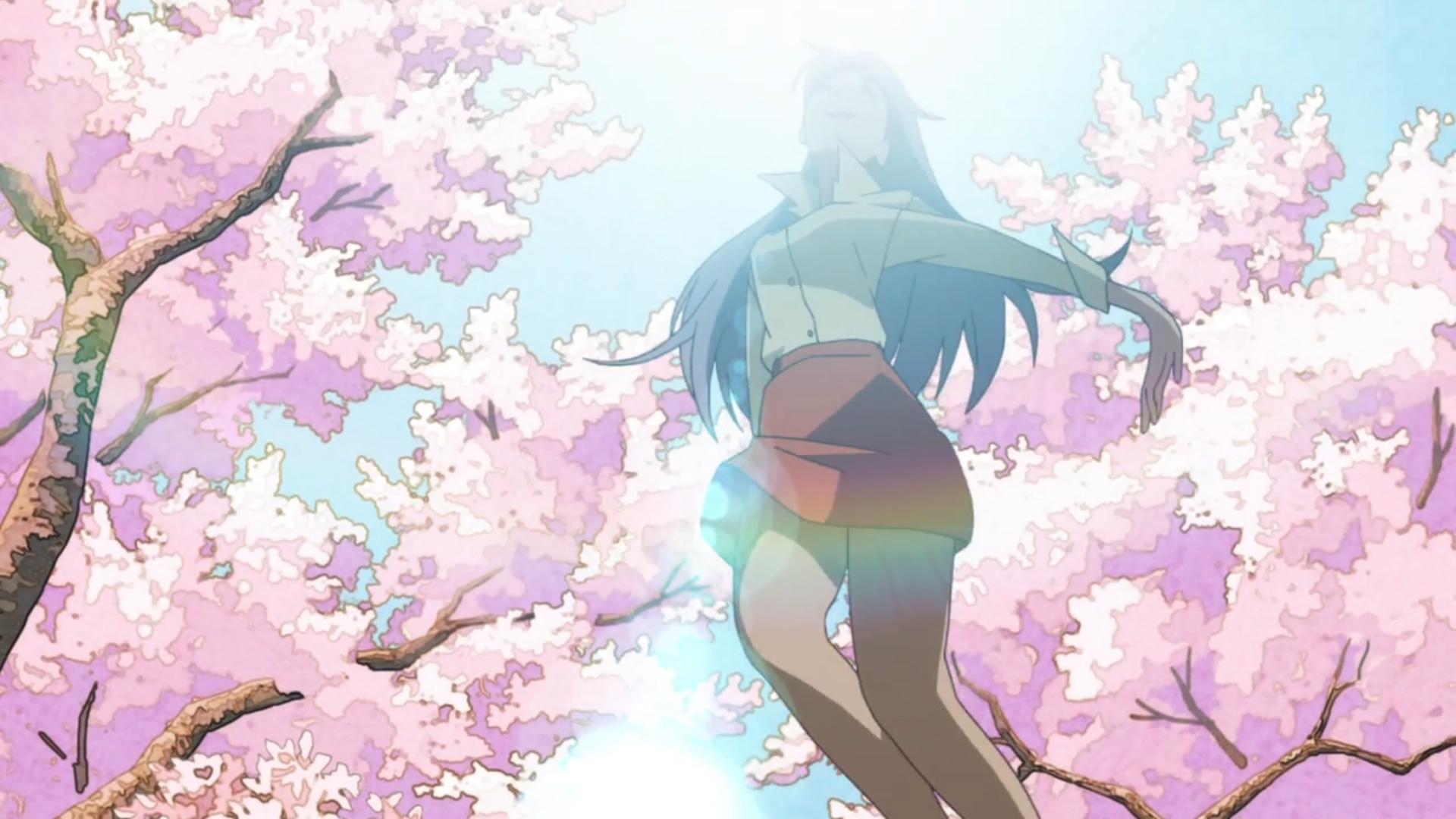
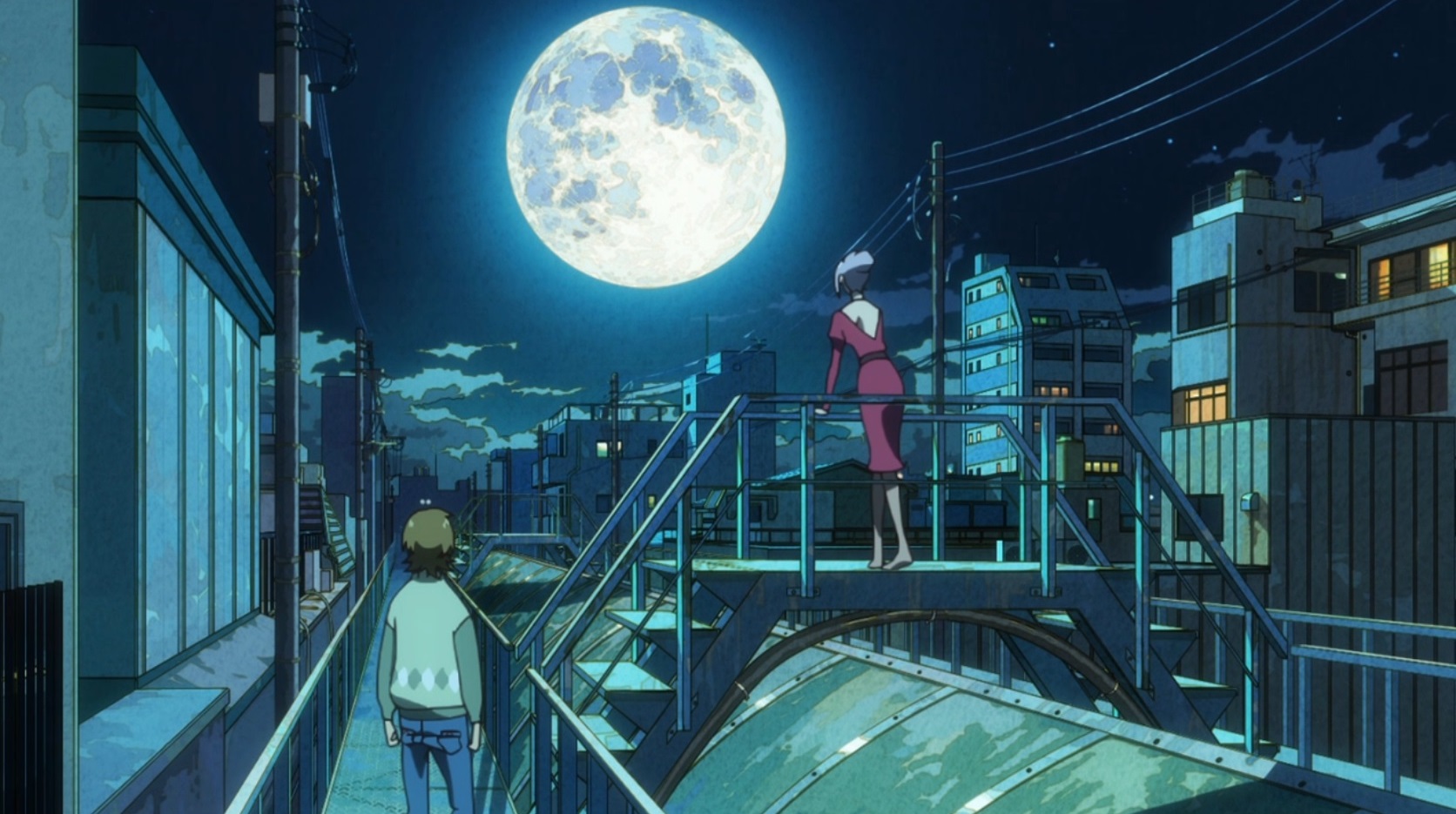
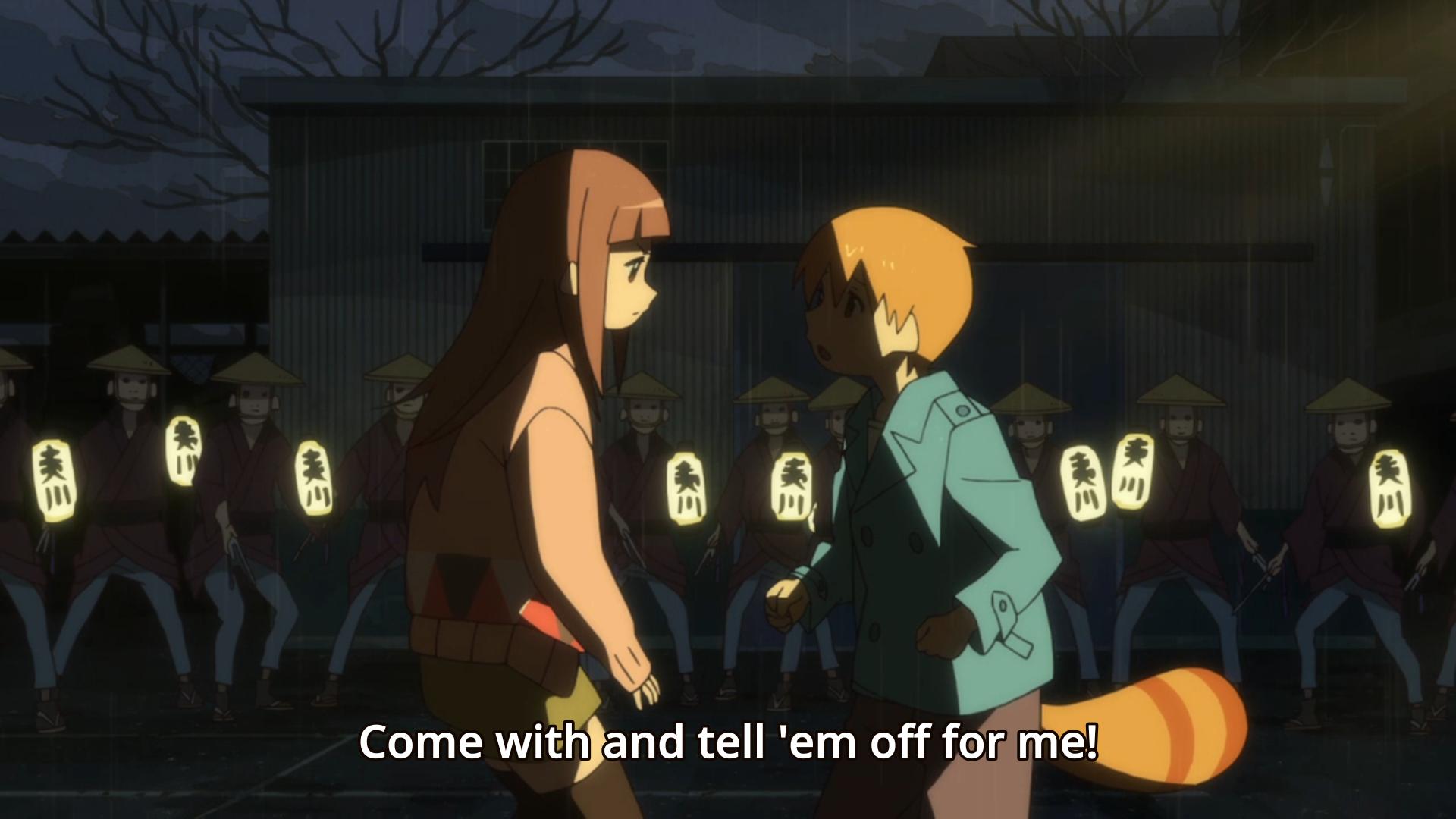
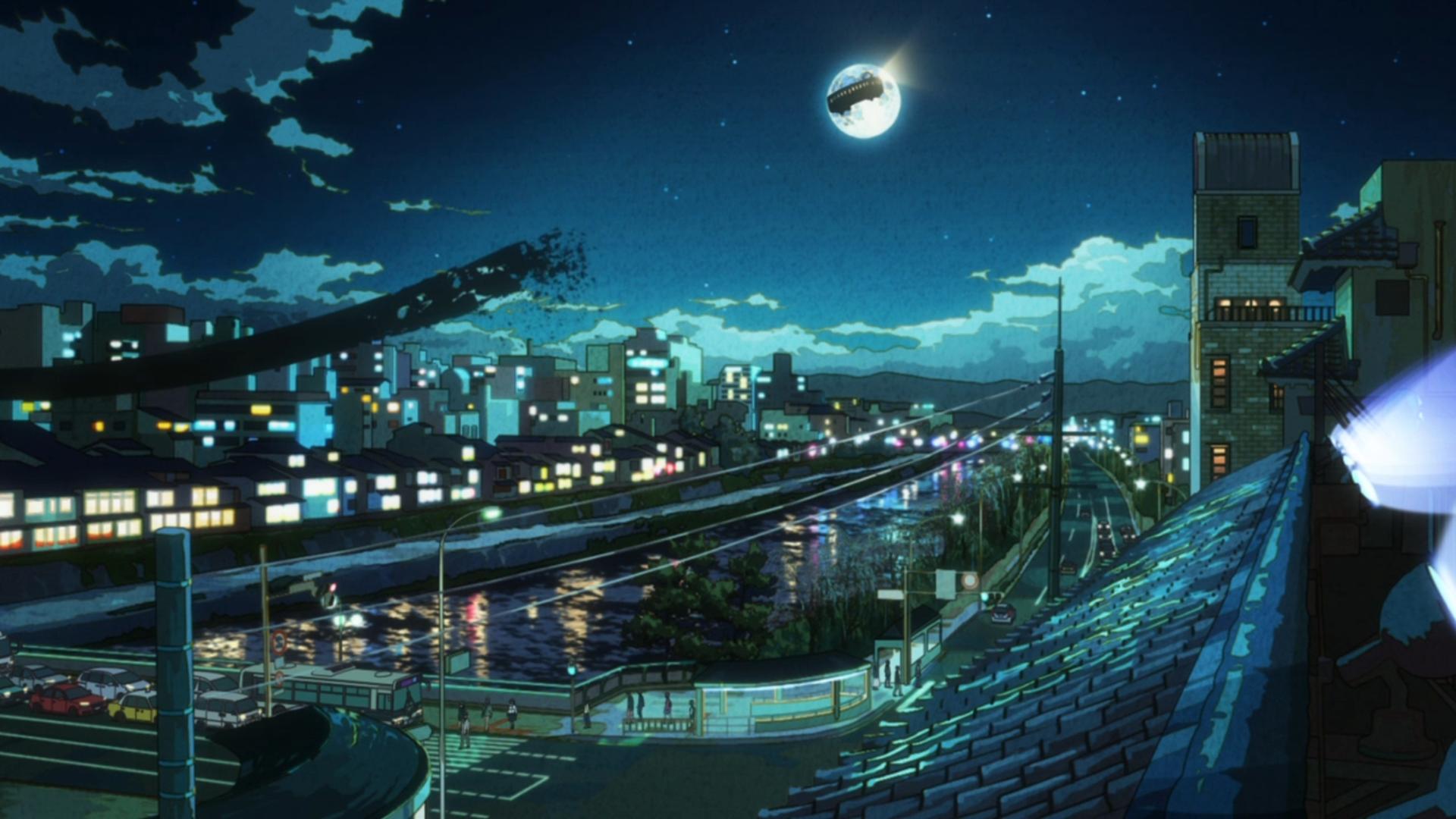
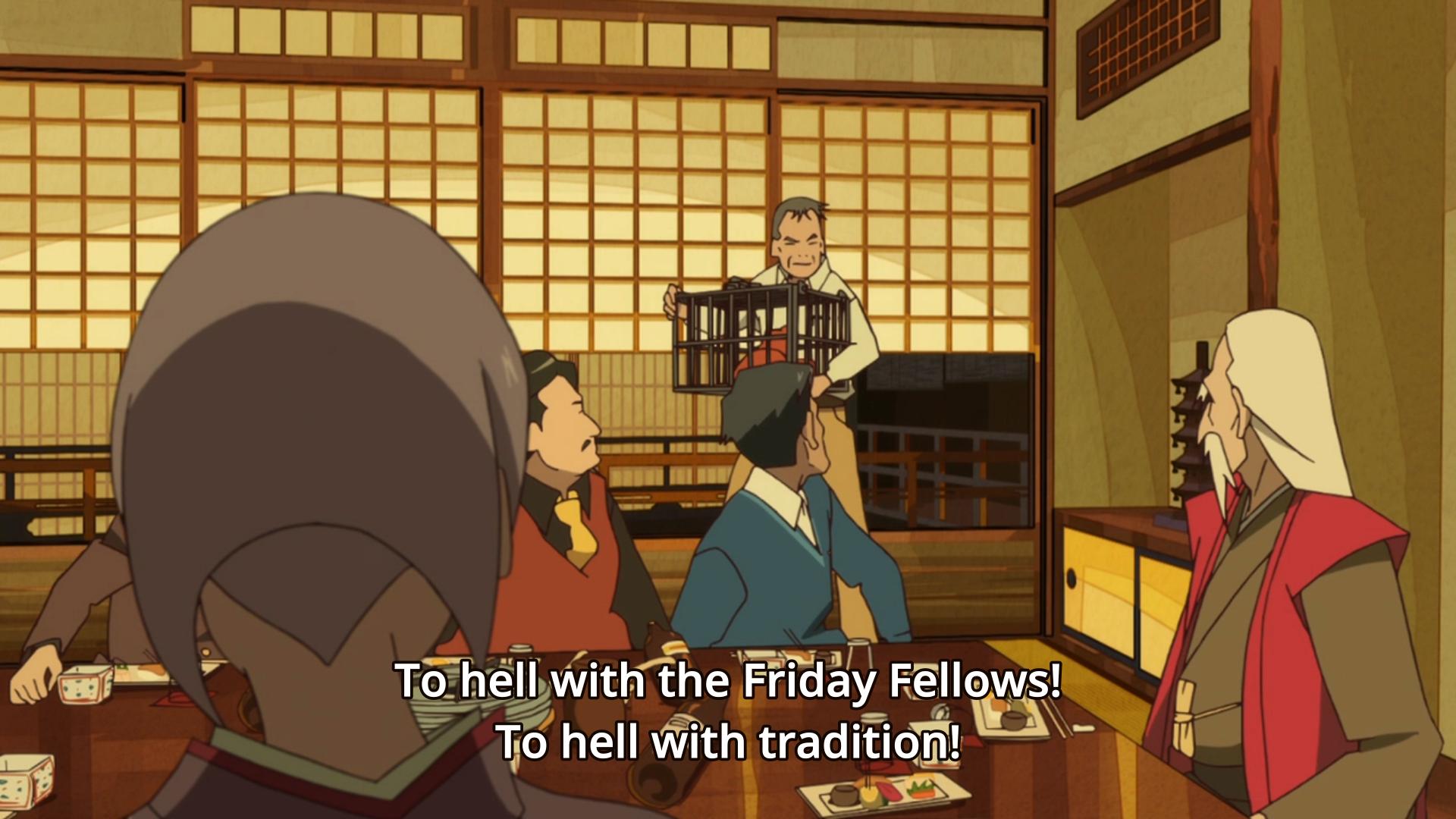
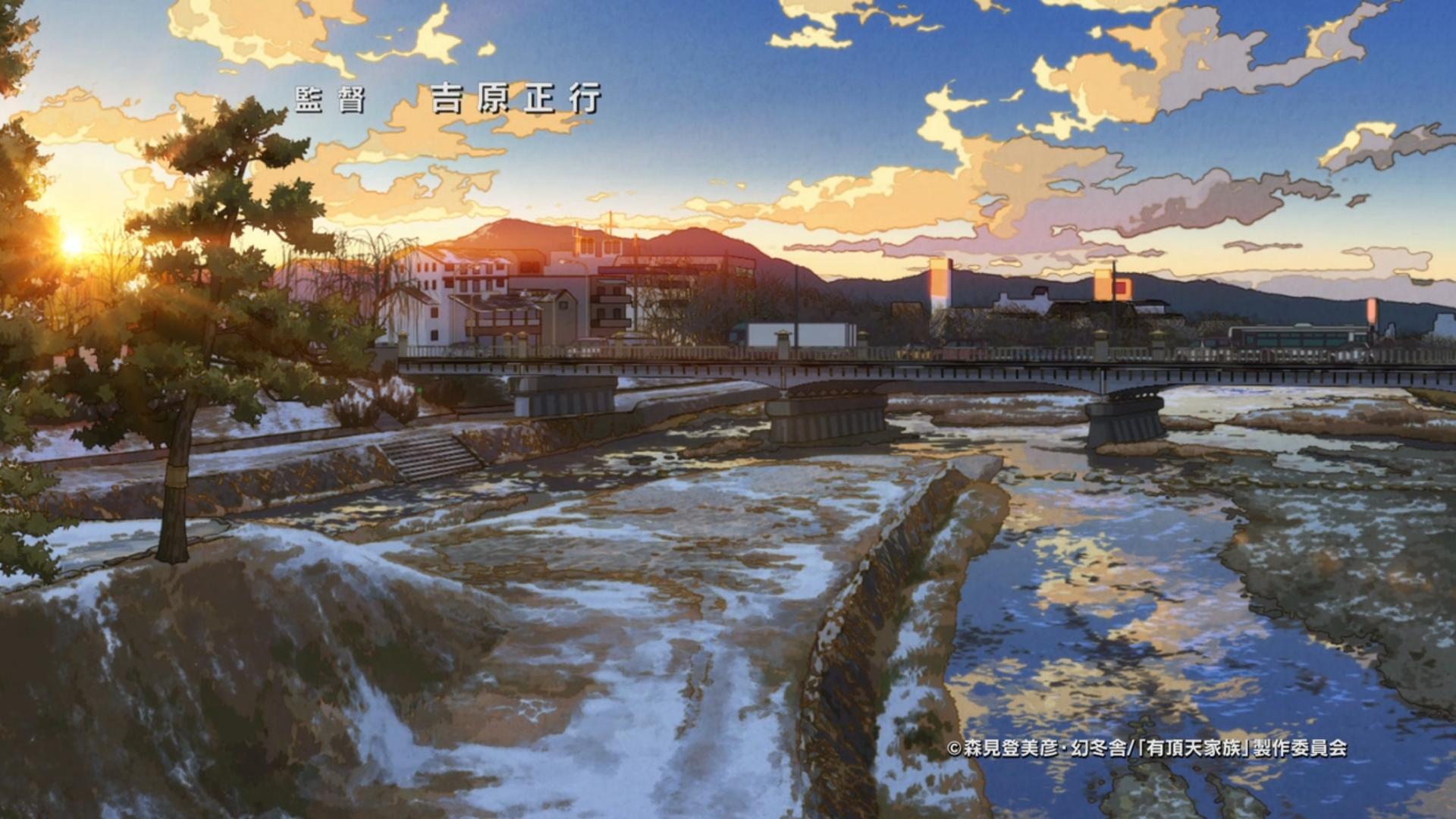
Pingback: 12 Days of Anime #11 – They Still Make Mature Anime! « Geekorner-Geekulture.
Pingback: Top Twelve Anime of 2013 | Wrong Every Time
Hey I really enjoy your blog and I love the explanations you give but after watching the Eccentric Family I left kind of conflicted. While I recognized a lot of the themes and messages the show presented, I left more confused than anything. Maybe it’s a nitpick but I never got a clear understanding of the society between the 3 species. So is tengu kidnappings kind of just viewed as eh whatever? Also are raccoon dogs not seen as these magical creatures that can talk and transform by the humans? A lot of little things keep taking me out of the story. The lack of consequences and the fact the show seem to breeze through some conflict left me more confused than anything.
About the lack of consequences (Ending spoilers, I guess)
I think it’s included in the show’s grace, but I think the perception of lack of consequences is due to it’s ability in using sublty. You have at the start a family slowly drifting apart to a family stronger than ever, including an extended family (like the professor, Benten, the cousin and a Human). You have a hikikkomori who gave up life and lives as a frog, to going back to enjoying life. Etc.
But the best example of it is in the epilogue, in an off hand narration. I didn’t notice at first but my brother picked it up and it amused me to no end:
Soun Ebisugawa, after ruinning the friday’s fellow party and the election flees to a hot springs and is never seen again. A hot sping, as in an euphemism for stew for the friday fellow.
It’s a kid friendly subtle explanation that’s in line with the happy magical realism of the show so far. It also sounds like something exiles would do in feudal japan, or the period tanukis in the show seem to borrow their traditions. that’s what make it work so well for me, because it’s easy to take stuff like that in the show at face value or literally.
The villain is punished at the end. I when I realized that, it seemed to have enough consequence for me.
Hey I really enjoy your blog and I love the explanations you give but after watching the Eccentric Family I left kind of conflicted. While I recognized a lot of the themes and messages the show presented, I left more confused than anything. Maybe it’s a nitpick but I never got a clear understanding of the society between the 3 species. So is tengu kidnappings kind of just viewed as eh whatever? Also are raccoon dogs not seen as these magical creatures that can talk and transform by the humans? A lot of little things keep taking me out of the story. The lack of consequences and the fact the show seem to breeze through some conflict left me more confused than anything.
The show just has a kind of dreamy sense of reality – the fantasy-world specifics of how it works aren’t something the show itself cares about. That said, I’m fairly sure tanukis are just considered mundane raccoon dogs to all humans except for Benten (who has stepped outside of the definition of a standard human) and the head of the Friday Fellows (who seems pretty far from human himself). As we saw in the rooftop conversation with the human professor, he was actually extremely surprised when a tanuki talked to him, and considered it most likely a dream.
It just seemed unsettling to me that murder is regarded so candidly sometimes in the show. It’s gave me whiplash to see the grief suffered by the Shimogamo family contrasting with the way they feel about being eaten sometimes (all raccoon dogs have a chance to end up in a hot pot!). While this may sound like I’m imposing my values upon the show (and in a way it may just be the case) but it’s difficult to reconcile their attitude towards murder which seems so….alien and the very familiar ideas about family they also display.One of the most gut wrenching scenes for me was episode 11 after Benten rescues Yasaburou but then cavalierly talks about how she might eat his brother later that night despite Yasa’s request to stop. In my mind it just seems so irredeemable for her. Also I agree to you up to a point about how Uchouten is steeped in magical realism but the fact that after Benten brought Yasa to entertain the Friday Fellows and the professor (and the rest of the members presented) seemed to take a liking to him but will still eat him requires a suspension of disbelief that I’m not sure I can make. In addition I don’t think that they (certain members of the Friday club) kind of seem them like pets (which is understandable because people still eat dogs/cats,etc in parts of the world) because they recognize the level of sentience in Yasaburou.
With all that being said, I’m probably thinking too hard on this and should just take it with a grain a salt huh? :p
Benten’s never fully redeemed by the show – she makes a turn back towards her original family, and she saves the brothers at the end, but she remains dangerous and capricious to the last, and I assume that’s intentional. That said, I somewhat doubt she’d actually have let Yasaburou’s brother be eaten – she says what she says because she feels hurt and she wants to hurt him back, but her crying at the well reveals she both regrets her actions and wants to apologize, but can’t do it in an active way.
As far as Yasaburou and the Fellows are concerned, outside of Benten and the leader of the Fellows, all of them just think he’s a human who knows some parlor tricks. Tanukis are strictly animals to them.
Hm I think ultimately I didn’t think some of the characters reacted in realistic ways. I can’t believe that humans have such oblivious perception to tanukis because of the very visible and bombastic (fake mountain anyone?) displays of their powers and existence. I don’t think Benten would of actively saved his brother if he didn’t come because didn’t lend a direct hand in save him and how glad she looked when Yasaburou showed up. And there was no comeuppance at all for some of the stuff that happens, so much so that it leads you to believe that tanukis don’t believe in punishing murder. That creates the disconnect that hurt it.
Well maybe the show’s portrayal of the obliviousness of humans to the fantastical happenings around them is a way of saying that while incredible things which defy logic may happen anywhere, anytime, it’s only right to take them in your stride and live on; treat them as if they were normal and perfectly believable. Why ? It’s because life was made to be interesting ( rehashing what the show told me ) and if you freak out with everything that eschews explanation, then you’re not really treating life with the right attitude. That being said, I get that this could be a straw man argument. Maybe the creators just didn’t care . I don’t think that’s a major obstacle to our enjoyment of this anime.
About the lack of gravity associated with the nonchalant talk and actual deeds of killing tanuki’s , I think the whole point was that tanukis, or at least ‘great’ tanukis like soichiro, have to come to terms with the natural order of things. Shit happens, and the act of tanukis meeting the end of the road at the hands of the Friday fellows is a way of life as ingrained into the workings of the city as having black hair is ingrained into my genes. So yeah, tanukis don’t believe in punishing murder, because it’s not murder per se, you could say it’s karmic retribution for living life as interestingly as possible, and you have to admit that dying by hotpot is as interesting as it gets. That being said, you’re right in saying that there’s definitely an acute disconnect between how we perceive the deaths as and how the tanukis do. It could be a way of portraying the act of blindly following tradition as ridiculous when it’s not backed by sound reasons in today’s “enlightened world” , and by the time we reach the end of the series, there is a movement away from tradition by the characters, and a greater appreciation of living in the moment. Yaichirou comes to terms with the nise-emon elections going against him, and instead of drowning in regret, his actions indicate that the defense of his family against defamation was worth more than the title of nise-emon. The professor friend of Yasaburo also rejects the tradition of the Friday fellows, and if you think about it, even soichiro was working against tradition in his time by being the first to unite the tanuki tribes. ( I might be moving abit into conjecture here, but you get my point ) SOOOO yea theres a disconnect but the show uses that to justify it’s rejection of tradition in the last episode. I hope this makes sense, I’m kind of new to the whole meaningful-and-intellectual discussion of anime.
Completely agreed with this. In the context of the show, these things both aren’t the focus and are mainly used as an articulation of the “take life as it comes, when we die that’s just how it goes” theme of both the show and tanuki society specifically. The connection of that to the idea of rejecting tradition does seem like a bit more of a stretch, but I like the idea!
Hmmm yes I can see where you’re coming from on the first part concerning live an interesting life theme and as I thought about it I found that it didn’t bother me as much as it did at first. But the second part, while I see where you’re coming from, I still hold doubts. The problem is that with murder, I don’t think it’s so much tradition as much as human nature. Now this is going to be verrrryyy broad and generalized but on the whole, most societies react negatively towards actual murder. That is to say the unjustified taking of a life. Even if it is justified societies punish it. By rejecting that, it is not so much rejecting tradition, but rejecting something that seem universally human. Let me give an example on how this disconnect hurts the show: say there’s a show about Mongols at time of Genghis Khan. They way they viewed life (and the sacredness of life) as well as some concepts like rape (whether it’s ok or not) and honor is fundamentally different than mine. While I might enjoy the show on a level where I can go “oh that’s interesting”, it would be hard to connect to them on a emotional level. If they try to make a whole episode focusing on the importance of family but then the next episode show them sacking a city and murdering everyone with a smile on their faces, I could not connect with the show at all because that shows the way they view life is totally different than mine.
The way that I rationalized the eccentric relationship the tanukis have with death and murder was to think of them still seeing the world in the rules of the animal kingdom, where being eaten is just as natural as eating others.
I though of it as seeing the world through the lens of an animal and just that we as humans, with no natural predators, are the unnatural ones for having the privilege of breaking off from this eat or be eaten cycle.
Pingback: Top 30 Anime of All Time | Wrong Every Time
Pingback: Top 30 Anime Series of All Time | Wrong Every Time
I don’t understand! This show is so cruel and messed up, and nobody is commenting about that, you said, in your review, that brought me to it in the first place, that it’s warm…. wtf? they are cannibals, whole family is messed up because the death of their father, and the one WHO F****** ATE HIM is, yeah, a friend, or what of the son… I mean, am I just an open nerve or something? I mean, I know he’s sort of an “animal” and therefore, he’s just going with the flow, or whatever, but that’s just an excuse, because he so easily fights back against his cousins… and benten and that f***ed up professor are like talking about how they murdered and ate his father, in front of him, while he’s taking pictures of them… like “we are just hanging out”… what is going on?!
not much, just chillin